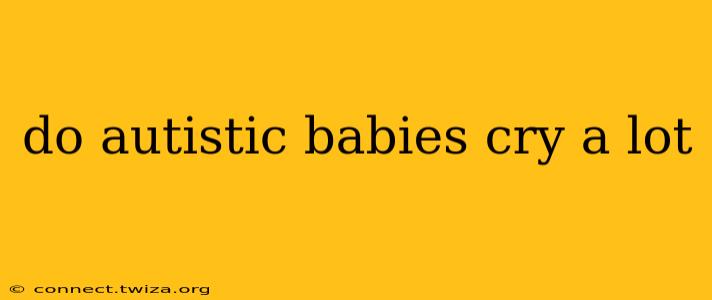Do Autistic Babies Cry a Lot? Understanding Infant Crying and Autism
Many parents wonder about the connection between infant crying and autism. While there's no single indicator that definitively points to autism in infancy, some studies suggest differences in crying patterns may exist. It's crucial to understand that autism is a complex neurodevelopmental condition, and crying habits are just one small piece of a much larger picture. Let's explore this topic further.
Is excessive crying a sign of autism in babies?
No, excessive crying is not a reliable indicator of autism in babies. Many infants cry frequently for various reasons, including hunger, discomfort, or needing attention. While some research suggests autistic infants might exhibit different crying patterns, this isn't a consistent or definitive sign. These differences might involve things like the intensity or duration of crying, or the types of sounds they produce, but more research is needed to confirm these observations. Focusing solely on crying as a diagnostic tool is misleading and inaccurate.
What are some common reasons why babies cry a lot?
Babies cry for numerous reasons, and most of these are unrelated to autism. These include:
- Hunger: A hungry baby will often cry persistently until fed.
- Discomfort: A wet diaper, uncomfortable clothing, or being too hot or cold can trigger crying.
- Sleepiness: Babies often cry when tired or overstimulated.
- Gas and Colic: These conditions can cause intense abdominal pain and distress, leading to prolonged crying.
- Illness: Babies cry more when they are sick or in pain.
- Attention-seeking: Babies may cry to get their parents' attention.
How can I tell if my baby's crying is different?
If you're concerned about your baby's crying, observe the overall pattern and context. Does the crying seem unusually intense or prolonged? Does it seem to respond to specific stimuli or situations? Keep a record of your baby's crying episodes, noting the duration, intensity, and any possible triggers. This information can be helpful for your pediatrician. Remember that parental intuition is valuable, and it's essential to share your observations with your healthcare provider.
Are there other early signs of autism in babies?
While excessive crying isn't a reliable indicator, other potential early signs of autism in babies can include:
- Delayed language development: Not babbling or pointing by a certain age.
- Limited social interaction: Not making eye contact, showing little interest in others, or not responding to their name.
- Repetitive movements or behaviors: Repeating the same actions over and over.
- Unusual sensory sensitivities: Being overly sensitive or under-sensitive to certain sights, sounds, textures, or smells.
When should I talk to my pediatrician about my concerns?
It's always best to discuss your concerns with your pediatrician. They can assess your baby's development and offer guidance based on their individual needs. While early detection is important, remember that a diagnosis of autism is usually made later in childhood after thorough evaluation by specialists. Early intervention services can be extremely beneficial, regardless of whether a formal diagnosis has been made.
Disclaimer: This information is for educational purposes only and does not constitute medical advice. Always consult with a healthcare professional for any concerns about your baby's health and development. The information provided here is based on current research and understanding, but the field of autism research is constantly evolving.
